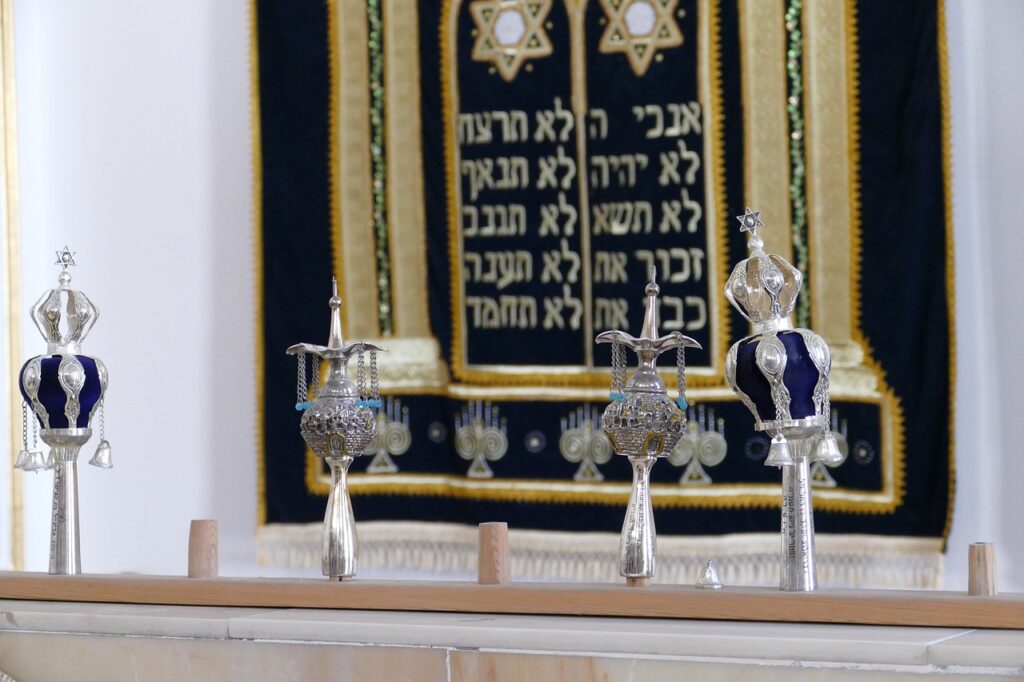A Long History of Coexistence
The Jewish heritage: Jewish community of Morocco has historical ties to the Maghreb region dating back more than 2,000 years. During World War II, the Late King Mohammed V famously rejected an appeal by the French Vichy regime to gather up Moroccan Jews for deportation, reportedly responding: “We have no Jews in Morocco, only Moroccans.” Though many Jews immigrated to Israel, France, Canada, and elsewhere beginning in the 1940s, “The Moroccan government, for its part, has embraced those who remained, and its support of the community has been held up as a symbol of Arab moderation and tolerance” (The Forward).
There are an estimated 3000 Jews currently living in Morocco, and there are synagogues in Casablanca, Essaouira, Marrakesh, and Fez, with over 15 active synagogues in Casablanca alone.
The coastal town of Safi, home to the shrine of Rabbi Abraham Ben Zmirro, remains a pilgrimage site for Jews from around the world. The western Moroccan city of Essaouira, home to the tomb of Rabbi Pinto, a venerated rabbinical judge who died in 1845, also attracts hundreds of Jews every year for a four-day celebration of his legacy.
Today, Serge Berdugo and Andre Azoulay, prominent members of Morocco’s Jewish community, serve as Ambassador at Large and Counselor to King Mohammed VI, respectively. Ambassador Berdugo is also the elected President of the World Organization of Moroccan Jewry. In April 2016, Casablanca hosted the country’s first Jewish film festival. Nearly 500 people attended three movie screenings on subjects relating to the Moroccan Jewish diaspora.
Preserving Religious Diversity
Morocco is engaged in a large-scale project to refurbish synagogues and other Jewish monuments to preserve the unique and historic aspects of Moroccan culture.
Morocco’s “Houses of Life” project, launched in April 2010, restored 167 Jewish cemeteries across the country, installing 159 new doors, building nearly 140,000 feet of fencing, and repairing 12,600 graves. The King has said that this project “is a testimony to the richness and diversity of the Kingdom of Morocco’s spiritual heritage. Blending harmoniously with the other components of our identity, the Jewish legacy, with its rituals and specific features, has been an intrinsic part of our country’s heritage for more than three thousand years. As is enshrined in the Kingdom’s new Constitution, the Hebrew heritage is indeed one of the time-honored components of our national identity.”
In February 2013, the 17th century Slat al Fassayine Synagogue in Fez reopened after two years of restoration. In a message for the inauguration ceremony, King Mohammed VI said, “I am committed to defending the faith and the community of believers and to fulfilling my mission with respect to upholding freedom of religion for all believers in the revealed religions, including Judaism, whose followers are loyal citizens for whom I deeply care… The Moroccan people’s cultural traditions, which are steeped in history, are rooted in our citizens’ abiding commitment to the principles of coexistence, tolerance and harmony between the various components of the nation.”
In April 2013, the Casablanca-based Museum of Moroccan Judaism, the only institution of its kind in the Arab world, was reopened to the public. The museum displays photos of synagogues from across the kingdom, Torah scrolls and Chanukah lamps, gold embroidered caftans, jewels, ancient rugs, and other objects of Jewish-Moroccan cultural heritage.
King Mohammed VI has also funded the preservation of Jewish burial sites in Cape Verde, once home to a vibrant Moroccan Jewish community.
Adopted by referendum in 2011, the Moroccan Constitution states that the country’s unity “is forged by the convergence of its Arab-Islamist, Berber and Saharan-Hassanic components, nourished and enriched by its African, Andalusian, Hebraic and Mediterranean influences,” and emphasizes Morocco’s attachment “to the values of openness, of moderation, of tolerance and of dialogue for mutual understanding between all the cultures and the civilizations of the world.”
Raising Holocaust Awareness in the Arab World
In a March 2009 speech launching the Aladdin Project for intercultural dialogue, King Mohammed VI called the Holocaust “one of the most tragic chapters of modern history.” This was the first time an Arab state had taken such a clear stance on the Holocaust.
In a message on the occasion of the International Day in Memory of the Victims of the Holocaust held at the United Nations on January 27, 2010, Morocco’s King Mohammed VI said that remembering the Holocaust “strongly imposes ethical, moral and political standards which will, tomorrow, be the true guarantors of this peace – based on equally-shared justice and dignity – and for which most Palestinians and Israelis yearn.”


Morocco is the best example of the coexistence between different religions. Its history is full by a lot of example, the reason why it’s enough to get there and you will have this positive feeling of being in multicultural environment.
I would like to have an other opportunitie to get there again.